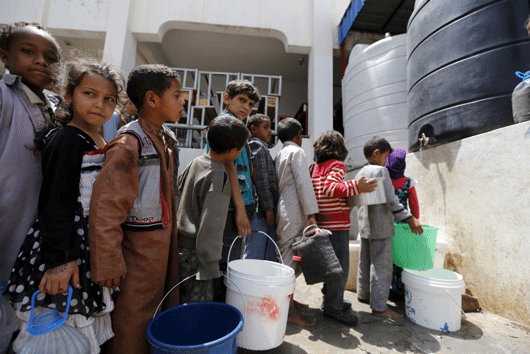
By Patrick Wintour
Indiscriminate acts of violence by both sides in the civil war in Yemen, including Saudi bombing of medical centers, is so widespread that the UK Home Office has declared that sending asylum seekers back to most parts of the country would likely be a breach of the European convention on human rights.
The internal assessment of Saudi strategy appears to run counter to claims by the Foreign Office that Saudi-led airstrikes have not been in breach of humanitarian law and there is no need to suspend arms exports to the country. Published on Wednesday, the Home Office assessment of Yemen was issued in guidance to its immigration and asylum decision-makers.
Hours later, a Foreign Office memorandum was released to the select committee on arms exports licences declaring that Saudi Arabia was aware of its obligations under international humanitarian law, and acting within the law. It asserted there was no need for the UK to suspend arms export licences to Saudi.
The difference in tone between the two reports, including the clear acceptance by the Home Office that the Saudi-led coalition has been involved in indiscriminate acts of violence against civilians, contrasts with the carefully worded Foreign Office defence of Saudi targeting procedures in Yemen. It underlines the diplomatic sensitivities inside the Foreign Office about the UK’s relationships in the Gulf.
In explaining its advice to decision-makers, the Home Office, in a lengthy assessment of the political security and humanitarian position in Yemen, states: "There are reports of the use of indiscriminate acts of violence by both sides including the use of cluster bombs and attacks on civilians, homes, schools, factories, markets and reports of civilians fleeing airstrikes and being chased and shot at by helicopters.
"In the north-west and center of the country levels of indiscriminate violence are likely to be at such a level that substantial grounds exist for believing such a person solely by being present there faces a real risk of harm which threatens their life or person".
It adds: "In the north, west and center of the country the humanitarian and security conditions are likely, in many cases, to breach Article 3 and/or Article 15(c) of the European convention." These articles forbid the return of someone to a country where their life is threatened.
Although the guidance states some parts of the country are not as dangerous, it suggests the chances of internal movement are limited.
The guidance stresses that both sides in the civil war have been involved in acts of indiscriminate violence, but it points out "nearly 6,000 people have been killed since the Saudi coalition entered the conflict, with almost half of those being killed civilians".
It adds: "While violent clashes continue across the country, with civilians largely bearing the brunt of the conflict, fighting and armed clashes have increasingly moved into eastern, central and northern Yemen"
Citing UN sources, the Home Office guidance adds: "Of the civilian casualties, 60% were as a result of air-launched explosives (ie from aircraft); 23% ground-launched; and 17% improvised explosive devices. The casualties were mostly in the largest urban areas, with the majority in Sana’a and surrounding districts."
By contrast, Lieut Gen Sir Simon Mayall, the former Ministry of Defence Middle East adviser until late 2014, warns the committee on arms exports not to succumb to the complaints of human rights and aid charities about Saudi behavior.
In the Foreign Office memorandum, he writes: "Our supporters are already dismayed and exasperated by our predeliction to indulge special interest groups over our national interest, our competitors can only see great opportunities to fill the economic vacuum that would be left by the UK’s actions, and our enemies will delight in seeing the UK’s commitment to Gulf stability weakened or broken.
"The Middle East is at a critical juncture, and only the Gulf states, wrestling with the fallout of instability, external interventions, terrorism and, now, economic weakness, provide any beacon of stability. Much of this stability has been established on a long-standing commitment by western powers to their security.
"While a complex ally, the Saudi Arabians are a key element of stability in the region, a vital element of the global economy, and a long-standing partner of the UK. It would be deeply prejudicial to the UK’s essential strategic interests to allow vital security considerations to get muddled up with, and compromised by, other agendas, in these dangerous and difficult times."
Saying his evidence is consistent with the advice he gave inside the Ministry of Defence, Mayall adds: "Now is simply not the time to take ill-considered risks in such a geopolitically sensitive region. While we would all believe that some political, economic and social reforms are critical to the long-term stability of the Gulf, vital to our own self-interest, does any serious policy-maker honestly believe that what we need in the region now is another Arab spring. The more secure the Gulf countries feel, the better the long-term prospects for reform, and therefore stability."
Source: The Guardian, Edited by Website Team